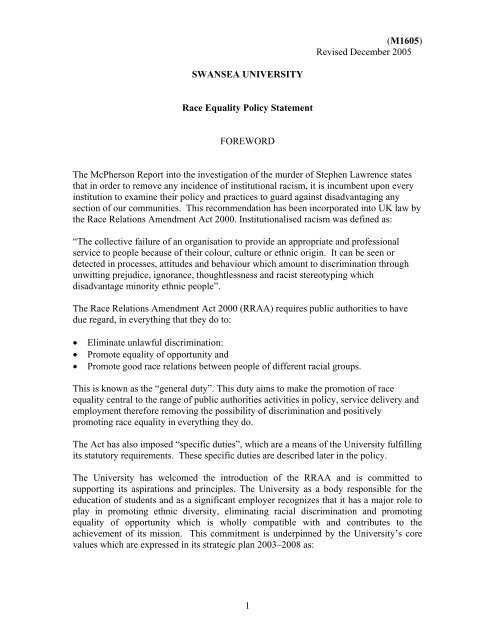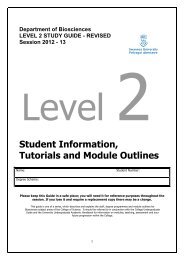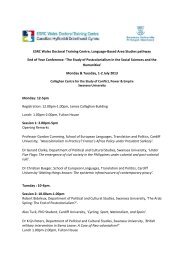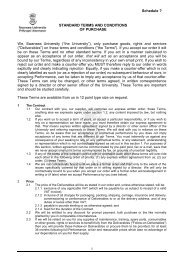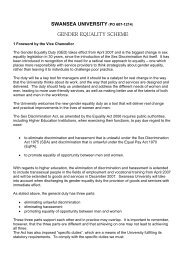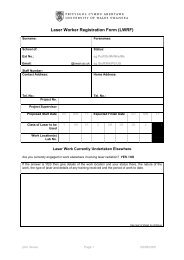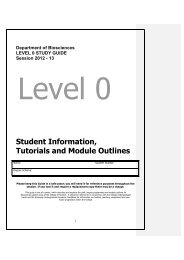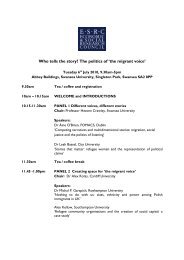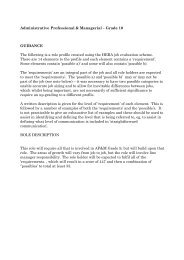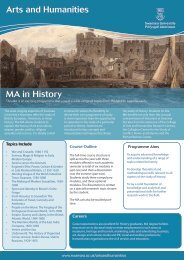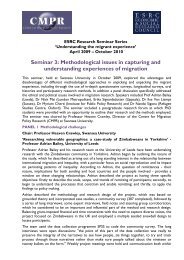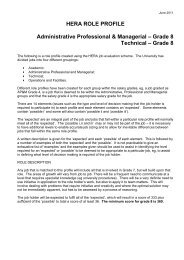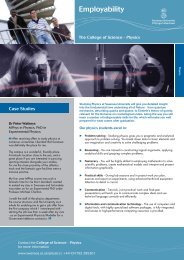Race Equality Policy - Swansea University
Race Equality Policy - Swansea University
Race Equality Policy - Swansea University
Create successful ePaper yourself
Turn your PDF publications into a flip-book with our unique Google optimized e-Paper software.
(M1605)<br />
Revised December 2005<br />
SWANSEA UNIVERSITY<br />
<strong>Race</strong> <strong>Equality</strong> <strong>Policy</strong> Statement<br />
FOREWORD<br />
The McPherson Report into the investigation of the murder of Stephen Lawrence states<br />
that in order to remove any incidence of institutional racism, it is incumbent upon every<br />
institution to examine their policy and practices to guard against disadvantaging any<br />
section of our communities. This recommendation has been incorporated into UK law by<br />
the <strong>Race</strong> Relations Amendment Act 2000. Institutionalised racism was defined as:<br />
“The collective failure of an organisation to provide an appropriate and professional<br />
service to people because of their colour, culture or ethnic origin. It can be seen or<br />
detected in processes, attitudes and behaviour which amount to discrimination through<br />
unwitting prejudice, ignorance, thoughtlessness and racist stereotyping which<br />
disadvantage minority ethnic people”.<br />
The <strong>Race</strong> Relations Amendment Act 2000 (RRAA) requires public authorities to have<br />
due regard, in everything that they do to:<br />
• Eliminate unlawful discrimination:<br />
• Promote equality of opportunity and<br />
• Promote good race relations between people of different racial groups.<br />
This is known as the “general duty”. This duty aims to make the promotion of race<br />
equality central to the range of public authorities activities in policy, service delivery and<br />
employment therefore removing the possibility of discrimination and positively<br />
promoting race equality in everything they do.<br />
The Act has also imposed “specific duties”, which are a means of the <strong>University</strong> fulfilling<br />
its statutory requirements. These specific duties are described later in the policy.<br />
The <strong>University</strong> has welcomed the introduction of the RRAA and is committed to<br />
supporting its aspirations and principles. The <strong>University</strong> as a body responsible for the<br />
education of students and as a significant employer recognizes that it has a major role to<br />
play in promoting ethnic diversity, eliminating racial discrimination and promoting<br />
equality of opportunity which is wholly compatible with and contributes to the<br />
achievement of its mission. This commitment is underpinned by the <strong>University</strong>’s core<br />
values which are expressed in its strategic plan 2003–2008 as:<br />
1
• Academic freedom and integrity<br />
• The paramount importance of its students<br />
• <strong>Equality</strong> of opportunity and respect for social, cultural and intellectual diversity<br />
• The personal and professional development of staff<br />
• The lifelong pursuit of knowledge and learning<br />
• Service to the community in the widest sense<br />
The <strong>University</strong> will ensure that all staff and students are aware of this policy and the need<br />
to implement it. To this end, I and the governing body of <strong>Swansea</strong> <strong>University</strong> will<br />
provide leadership in relation to the implementation and integration of the <strong>Race</strong> <strong>Equality</strong><br />
<strong>Policy</strong> and Action Plan.<br />
<strong>Equality</strong> of opportunity is a central aim of <strong>Swansea</strong> <strong>University</strong> for all staff, students and<br />
members of Council, and I commend this <strong>Race</strong> <strong>Equality</strong> <strong>Policy</strong> as part of the university’s<br />
overall commitment to equal opportunities.<br />
SIGNED<br />
.......................................................... VICE CHANCELLOR<br />
Introduction<br />
The <strong>Race</strong> Relations (Amendment) Act 2000 (RRAA) places a general duty on public<br />
authorities to promote race equality. This policy has been drawn up in accordance with<br />
the Commission for Racial <strong>Equality</strong> Statutory Code of Practice, to eliminate racial<br />
discrimination, promote equality of opportunity and promote good race relations and to<br />
address the specific duties imposed by the Code of Practice. These specific duties are:<br />
1. To prepare a written statement of its policy for promoting race equality and have in<br />
place arrangements for fulfilling its duties as soon as is reasonably practicable.<br />
2. To assess the impact of its policies, including its race equality policy, on students and<br />
staff of different racial groups.<br />
3. To monitor, by reference to those racial groups, the admission and progress of<br />
students and the recruitment and career progress of staff.<br />
2
4. Include in its written statement of its race equality policy an indication of its<br />
arrangements for publishing that statement and the results of assessment and<br />
monitoring.<br />
5. To take such steps as are reasonably practicable to publish annually the results of its<br />
monitoring .<br />
The <strong>University</strong> is committed to promoting race equality, seeking to eliminate racial<br />
discrimination and promoting good relations between people of different racial groups.<br />
In exercising this commitment, the <strong>University</strong> undertakes to formally review the <strong>Policy</strong><br />
and this Action Plan on a 3 yearly basis. This time frame provides the <strong>University</strong> with<br />
evidence and experience upon which to judge whether or not the previous <strong>Policy</strong> and<br />
Action Plan has been effective.<br />
The review will ensure that both <strong>Policy</strong> and Action Plan are reflective of the <strong>University</strong><br />
and its business, and will pay attention to any key organisational changes, restructures or<br />
amendments to the Institutions remit.<br />
It will also ensure that the <strong>Policy</strong> and Action Plan become a living document reflecting<br />
current and future plans for implementing the race equality duty. Specific guidance from<br />
the Commission for Racial <strong>Equality</strong> states that when conducting the review<br />
“To fulfill its race equality duties and arrangements, Higher Education Institutions<br />
should be able to demonstrate:<br />
• How the review and maintenance of their policy is built into their action plans<br />
• How progress in meeting the commitments set out in their policy will be<br />
measured<br />
• How actions, past and present, will result in positive outcomes.”<br />
The <strong>University</strong> will fulfill the required duties of the RRAA(2000) in relation to:<br />
• Governance<br />
• Student admissions<br />
• Student assessment and academic progress (Including Teaching & Learning)<br />
• Student Support Services<br />
• Employment (recruitment, selection, training, career progress, and development<br />
including selection for the RAE where applicable)<br />
• Behaviour and Discipline<br />
3
These are all functions which directly affect staff and students at work and study.<br />
Fulfilling the duties and ensuring the integration and mainstreaming of race equality in<br />
relation to these functions is addressed in the <strong>Race</strong> <strong>Equality</strong> Action Plan. The Action<br />
Plan will:<br />
Define the <strong>University</strong>’s core functions<br />
Set up a consultation and communication framework<br />
Provide practical guidance on equality proofing work and impact assessments<br />
Set out the framework for action plans in each functional area<br />
Set out arrangements for monitoring<br />
Set out arrangements for review and publication<br />
Demonstrate a commitment to training<br />
Set out arrangements for dealing with racial harassment<br />
The weight given to race equality should be in proportion to its relevance. All parts of the<br />
duty are complementary and necessary. The <strong>University</strong> will ensure that the aims of the<br />
general duty are promoted throughout the <strong>University</strong> through communication to staff and<br />
students and that racial equality is mainstreamed throughout the <strong>University</strong>’s policies and<br />
procedures.<br />
The <strong>University</strong>’s Equal Opportunities Code of Practice states that:<br />
“<strong>Swansea</strong> <strong>University</strong>, in conformity with the general intention of its charter, confirms its<br />
commitment to a comprehensive policy of equal opportunities in employment in which<br />
individuals are selected, trained, appraised, and promoted including selection for RAE<br />
where applicable, and otherwise treated on the basis of their relevant merits and abilities<br />
and are given equal opportunities within the <strong>University</strong>.” In accordance with the Equal<br />
Opportunities Code of Practice, this <strong>Policy</strong> is specifically intended to ensure that race<br />
equality is central to the review and formulation of all relevant policies and procedures<br />
within the <strong>University</strong>. The <strong>Policy</strong> has been produced as a separate document to <strong>Swansea</strong><br />
<strong>University</strong>’s Equal Opportunity Code of Practice as the latter document relates only to<br />
staff whereas this <strong>Policy</strong> relates to staff, students and to others to whom the <strong>University</strong><br />
provides services.<br />
Consultation and Communication<br />
Development, implementation, review and maintenance of this policy will be undertaken<br />
through consultation with staff, students, trade unions, ethnic groups and community<br />
representatives. This will ensure that all involved with the institution will not only have<br />
an input into creating institutional functioning that is race equality based, but will also<br />
enable issues of concern to be raised with confidence. A committee or working group<br />
including representatives from these constituencies has been established to oversee<br />
development of the policy and the implementation of the action plan.<br />
4
Communicating the details of the race equality policy and the ways in which the<br />
<strong>University</strong> intends to fulfill its general and specific duties are detailed in the action plan<br />
and include relevant sector specific guidance provided by the <strong>Equality</strong> Challenge Unit.<br />
Effective communication is most likely to be achieved through multiple channels. The<br />
key channels of communication will be:<br />
• Consultation processes within the <strong>University</strong> and with local communities<br />
• The devolution of responsibility for policy impact assessment to responsible bodies<br />
and individuals<br />
• Publicity of the race equality policy and action plan on the web site<br />
• Regular items in staff and student newsletters<br />
To ensure that all staff are aware of their individual and organizational responsibilities<br />
under the Act, the <strong>University</strong> will implement a comprehensive training programme. This<br />
will focus on the aims of the general duty and promote the equal opportunity values of<br />
the <strong>University</strong>.<br />
Governance, Roles and Responsibilities<br />
The Council of <strong>Swansea</strong> <strong>University</strong> is responsible for ensuring that the institution<br />
complies with all the race relations legislation requirements, including the general and<br />
specific duties arising from the RRAA.<br />
Council is responsible for ensuring that the <strong>Race</strong> <strong>Equality</strong> <strong>Policy</strong> is planned,<br />
implemented, monitored, evaluated and continuously reviewed according to the general<br />
and specific duties. Council will receive the annual report and monitor the<br />
implementation of the policy and action plan through the publication of an annual report.<br />
The Vice-Chancellor is responsible for ensuring that the policy and its related action<br />
plans, procedures, strategies and arrangements, are implemented and that members of<br />
staff are provided with the opportunity to attend the appropriate training as detailed in the<br />
race equality action plan. He is responsible for ensuring that all staff are aware of their<br />
responsibilities and accountabilities under the policy and are adequately supported in<br />
order for them to appropriately fulfill these responsibilities. The Vice-Chancellor is<br />
responsible for ensuring that appropriate disciplinary action is taken against staff or<br />
students who are found to be guilty of racial discrimination.<br />
Heads of Department will be responsible for ensuring that staff and students within their<br />
departments are aware of their responsibilities to eliminate race discrimination, promote<br />
equality of opportunity and promote good race relations. Heads of Department will<br />
ensure that any incident of race discrimination or harassment is dealt with appropriately<br />
and that racial bias and stereotyping is eliminated.<br />
All members of staff and students share a collective responsibility to comply with the<br />
<strong>University</strong>’s policies and procedures, with relevant legal legislation, and with the outlined<br />
5
functions, according to their individual roles and responsibilities. Any incidents<br />
identified as unlawful discrimination will lead to invoking of the staff or student<br />
disciplinary procedure.<br />
The <strong>University</strong> has introduced a “Dignity at Work & Study <strong>Policy</strong>” which highlights an<br />
effective transparent anti-racist complaints procedure. All staff have the opportunity to<br />
be adequately trained in how to deal with racist incidents, and how to identify and<br />
challenge racial bias and stereotyping through the implementation of the appropriate<br />
procedures under the policy. The Staff Development Officer working in partnership with<br />
the Equal Opportunities Officer will provide appropriate training. The Personnel<br />
Department/Staff Development Unit will provide a rolling programme of race awareness<br />
and other relevant training for staff. The <strong>Race</strong> <strong>Equality</strong> Action Plan indicates in detail the<br />
training and support required by individuals and how this will be provided.<br />
All staff and students will be made aware of the policy. Staff and students must not<br />
discriminate on racial grounds and staff should be aware of the need to work to<br />
mainstream race equality in all the relevant functions of the institution. The <strong>University</strong><br />
has a policy entitled “Dignity at work and Study (Combating harassment)” which<br />
includes arrangements for dealing with racial harassment. It takes into account the needs<br />
of all staff, students and others involved. Appropriate training and information events<br />
organised by the institution will be made available to all staff.<br />
Contractual Arrangements and Services<br />
Any contractual or other service provision arrangements made on behalf of the institution<br />
with outside public, voluntary or private organisations, to obtain goods, works or<br />
services, have to be within the requirements of the general and specific duties. The<br />
<strong>University</strong> is responsible, through contractual agreements, for meeting the general duty<br />
requirements concerning those particular functions in which they are involved.<br />
Specific Duties<br />
1. <strong>Policy</strong> Statement<br />
Further and higher education institutions have specific duties under the Code of Practice<br />
to:<br />
(a)<br />
(b)<br />
prepare a written statement of its policy for promoting race equality and<br />
have in place arrangements for fulfilling, as soon as is reasonably practicable, its<br />
duties under the Act (through an Action Plan).<br />
Developing, implementing and maintaining the <strong>Race</strong> <strong>Equality</strong> <strong>Policy</strong> will be an ongoing<br />
process through continuous improvement and effective implementation. The Action Plan<br />
will give priority to the involvement of and consultation with staff, students, trade union<br />
and other representatives. This process is coordinated by the <strong>Race</strong> <strong>Equality</strong> Working<br />
Group that supports the development of the policy and has overall responsibility for<br />
6
equality. It also coordinates the process of policy, planning, implementation, review and<br />
publicity.<br />
2. Assessing the Impact of Institutional Policies and Review<br />
All HEIs must assess the impact of all their institutional policies on students and staff<br />
from different racial groups.<br />
• An assessment of policies and procedures are undertaken in accordance with the<br />
procedures as indicated in the race equality action plan.<br />
A review procedure has been developed to assist in a systematic analysis of policies and<br />
procedures. The procedure will involve:<br />
• The collection of statistical data and the conduct surveys of staff and students<br />
• The analysis of differences in application of policies and procedures between<br />
different racial groups<br />
• The explanation of any differences and any relevant justification<br />
• Where differences cannot be justified, examine policies which may have produced<br />
differences<br />
• Taking action to change policies, procedures and related targets and strategies<br />
3. Monitoring Admission, Recruitment and Progress<br />
Further and higher education institutions must monitor, by racial group, student<br />
admission and progress, and staff recruitment and career progress. The collection of data<br />
is an essential step in carrying out review of policies and procedures.<br />
Where possible, the <strong>University</strong> will collect data according to the ethnic categories<br />
recommended by the CRE in the CRE Guide on Ethnic Monitoring.<br />
Students<br />
The <strong>University</strong> will develop and maintain data to monitor the student admissions process<br />
and student achievement and progress. Such data will include for example:<br />
• Applications and success and failure rates for admission<br />
• Choice of subjects<br />
• Drop-out rates<br />
• Year-on-year achievement levels<br />
• Assessment outcomes and types of assessment<br />
• Class of degree<br />
• Appeals and their outcomes<br />
• Reports of racist incidents and outcomes<br />
• Work placements<br />
7
The sources of the data will include:<br />
• Statistical analysis<br />
• Satisfaction surveys<br />
• Complaints by students<br />
• Complaints of harassment, discrimination and unfair treatment<br />
• Other services provided to staff and students (e.g. accommodation, catering, sports<br />
facilities)<br />
Employment<br />
The Equal Opportunities Action Plan for Staff, which includes an analysis of<br />
employment issues with regard to race, will set out the monitoring statistics, which are to<br />
be collected. In general statistics should show the data:<br />
• analysed by gender, ethnicity and disability<br />
• analysed by staff category/grade<br />
• analysed by department or departmental group<br />
• analysed by part-time/full-time and permanent/fixed term appointments<br />
• show improvements or (deterioration over time)<br />
• be contextualised by reference to appropriate comparative data<br />
• be related to population ‘pool’ data (e.g. the proportion of ethnic minorities in the<br />
population group and the rate of staff turnover)<br />
Employment statistics should be collected in the following areas, analysed and<br />
publicised:<br />
• current staff – analysed as above<br />
• starters and leavers<br />
• promotions<br />
• staff development<br />
• recruitment<br />
• discipline and grievance<br />
• RAE submissions<br />
Whilst appraisal monitoring is recommended by the RRA Code of Practice Guidance for<br />
Institutions of Higher Education it may not be as appropriate to schemes of a<br />
developmental nature currently in place at <strong>Swansea</strong> <strong>University</strong> as to the performance<br />
based schemes of some organisations.<br />
The <strong>University</strong> will regularly assess its monitoring information to evaluate the progress<br />
being made towards meeting its race equality goals and aims. These assessments will<br />
help the <strong>University</strong> to:<br />
• Highlight differences between staff and students of different racial groups<br />
• Ask why these differences exist<br />
• Review how effective current goals and aims are<br />
8
• Decide what may be done to improve performance<br />
4. Publishing Arrangements<br />
The results of monitoring, progress in implementation of the Action Plan and the review<br />
of policies and procedures will be published annually through an annual report which will<br />
be made available to all staff and students and distributed to local and national interested<br />
groups such as <strong>Swansea</strong> Bay <strong>Race</strong> <strong>Equality</strong> Council and the CRE.<br />
The <strong>University</strong> will make arrangements to ensure that information and material that is<br />
provided for the community is accessible in user-friendly language.<br />
December 2005<br />
9


